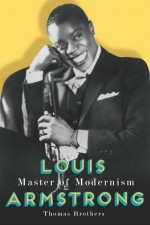Thomas Brothers’ second volume in his massive Louis Armstrong biography begins in 1931 with Satchmo singing “I’ll Be Glad When You’re Dead, You Rascal You” (a.k.a. “You Rascal You,” a.k.a. “I’ll Be Glad When You’re Dead”) to the Memphis police.
The song’s indistinct title parallels the various uses Armstrong, and those around him, put it to. In this case, Armstrong’s telling off the same cops who arrested him the night before—for talking to a white woman, who turned out to be his white manager’s wife. But the men in blue don’t get the scorn and they lap up the “praise.”
Not to be outdone, the trumpeter had also passed around reefer in the holding cell. Loose joints in the joint.
The author, a music professor at Duke University, does an elaborate and estimable job of spotlighting Armstrong against modernism, against race relations in America, and against the private and public concerns of the man himself across the decades.
Brothers even puts in several pages of praise for Armstrong’s controversial and often-maligned singing. The result is a deeply researched account of a genius sticking into, out of, and occasionally it to, his country.





